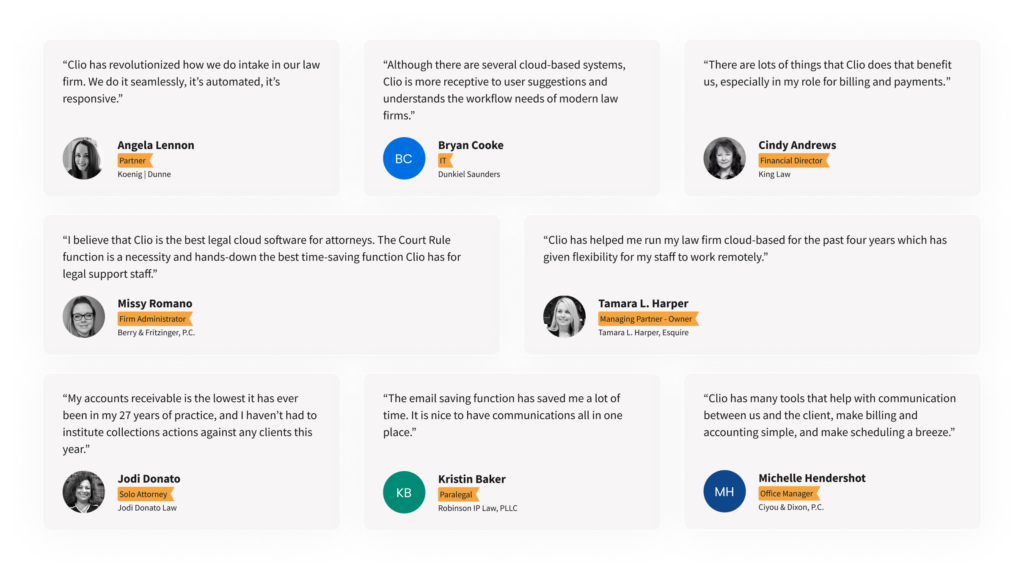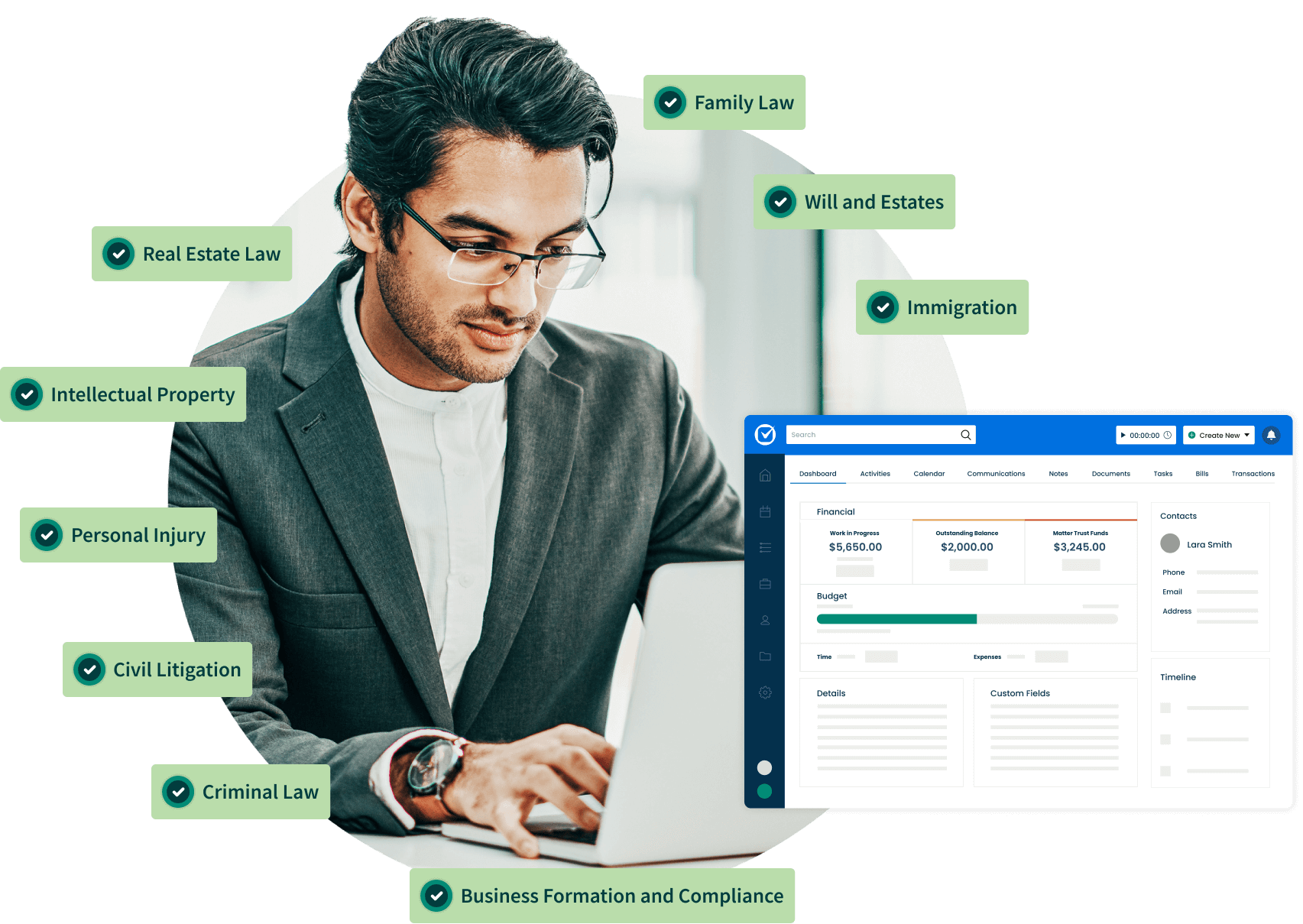![]()
Client intake & CRM
![]()
Case & Matter Management

Document & File Mgmt
![]()
Billing & Invoicing
![]()
Payments (ACH, eCheck, Credit)
![]()
Time & Expense Tracking
![]()
Workflow Automation
![]()
Legal Calendaring
Approved by 100+ bar associations & law societies




Legal Software Tour
No lock-in contracts. No obligation.
Comprehensive legal management software that meets the needs of your firm—and your clients
-
Billing
Make it easy to send bills & get paid

-
Client Onboarding
Easily attract and win new clients

-
Document Management
Every document, accessible from anywhere

-
Calendaring
Reminders to hit every deadline

G2 has ranked Clio the #1 product for legal practice management and #1 in market presence seven years in a row.

Law firm management software that’s secure, reliable, and scalable for firms of all sizes.
-

Industry Leading Security
Every byte of data—yours and your clients’—securely stored in the cloud.
Dedicated 24x7x365 security team
Continuous vulnerability monitoring
GDPR, SOC2, PCI compliance, and more
-

Award-Winning Care
Exceptional customer care from the most experienced team in the industry, 24/5.
Free on-demand training
Data migration support
Comprehensive self-serve support site
Intuitive, easy-to-use law firm software.
Comprehensive practice management software that meets the needs of your firm—and your clients
-
Frustrated by outdated legal software?
We understand migrating data from one system to another can be overwhelming. That’s why our dedicated onboarding team is ready to assist your firm’s transition to Clio.

Migration
Consultation
Data Export
& Processing
Data Import
& Review -

Legal management software that works for every member of your firm

Clio—a solution for any legal practice
Every practice area. Any law firm size, small or large.

All your favorite tools, working together
With over 250 apps available in the Clio App Directory, the tools your firm loves and needs are only a click away.

Get more with your law software
Receive award-winning support, industry-leading security, access to Clio Integrations, and more—at no extra cost.
-
Unlimited data storage you control
Maintain full data ownership, and control it all with multi-level user permissions.
-
Award-winning 24/5 support
Data migration regardless of user count. Ongoing support via phone, email, or live chat.
-
Secure, reliable cloud software
Priority, encrypted data backups, with 2FA and a 99.99% uptime SLA guarantee.
-
Online payments made simple
Simple, transparent transaction rates with no hidden fees.
-

From $39 to $129, Clio's pricing plans are built to fit your firm's needs.
Work smarter with e-signatures, plus Outlook and Gmail integrations
Get Started
Manage cases, tasks, documents, billing and calendars, all in one place.
Save time with automated document templates.
Scan physical documents into Clio.
Accurately track time and expenses. Bill hourly, flat fee, or contingency.
Frequently Asked Questions
What is legal software?
Legal software connects your intake, calendaring, billing, and documentation for a seamless client experience.
In short, Clio legal software is secure, reliable and makes managing your law firm a breeze.
Who at my firm will use legal software the most?
Anyone can benefit from legal software as it assists with client management, intake form creation, client and lawyer appointment and reminder scheduling, invoicing, case management, and more.
What is the best legal software?
Clio is trusted by over 150,000 legal professionals and is approved by more than 90 bar associations and law societies worldwide, making it the best legal CRM software for law firms. In addition, Clio has an average rating of 4.5/5 stars across 3,000+ reviews on G2 Crowd, SoftwareAdvice.com, Capterra, and Lawyerist.
What happens when a potential client actually becomes a client?
We offer an end-to-end solution to managing and growing your firm. Once a client is secured, you can seamlessly transition their case information into our legal case management software.
Why should my law firm use case management software?
From automation to document creation, legal case management software keeps you organized on matters and cases, so you can manage more clients in less time and streamline your business at every step.
Case management solutions help lawyers spend more time focusing on practicing law and serving clients, and less time doing administrative and non-billable tasks.
What kind of customer support is included?
We offer unlimited support 24 hours a day, 5 days a week, so we can answer any questions you might have without impairing your working day.
How do I transfer my current cases into my new software?
Our data migration team can assist in bringing over information from another legal case management solution to our software so that you don’t have to do it manually.
What features does legal case management software have?
The following are all crucial features to look for in legal software packages. We have listed all these features below so you know what you are looking for when the time comes to implement a software solution at your practice.
Case management: The ability to manage clients and cases and keep all case information organized. This enables you to quickly refer to notes about the case and prepare for court in the most efficient way possible.
Client/contact management: Case management also takes place on a per-client or per-contact basis, so managing your face to meetings and calls with the client is crucial.
Task management: The ability to create and assign tasks to different staff and lawyers. Sophisticated solutions like our legal case software can automate parts of this process when a case is created. Our software suite even allows you to automate the billing process so you can reduce any potential cash flow problems you might encounter.
Calendar: Your case management tool needs a full calendar with capabilities to manage your busy schedule, as well as sharing your calendar with colleagues. That way you can avoid possible dreaded meeting room clashes.
Timekeeping: The ability to enter time as you work or after the fact. Case management software with timers helps you capture more billable time while you work. This means you will be able to streamline your billing process and keep on top of all the cases your practice handles.
Email: Your legal case software should integrate with your chosen email provider. This makes it easier for lawyers to file emails to cases and follow-up on any developments. Another email feature you might be interested in is whether your chosen software can create a database of email addresses for each case the lawyers at your practice are currently working on.
Document management: Can you use it to organize and store documents, and collaborate on them? Does it integrate with GSuite or your Microsoft Office package? These are questions that need answering so you can fully integrate your chosen software solution into your workflow.
Document automation: Many case management softwares allow you to use templates to automatically create new documents, saving lawyers valuable time.
Accounting: Your legal case software may not have a full accounting solution, but you should be able to reconcile accounts and view balances and transactions. You can also use the software to set up invoice reminders and automate the collections process. Therefore, this reduces the time you spend chasing up invoices, asking lawyers to send out invoices or getting invoices validated.
Trust accounting: The ability to track transactions related to operating accounts and trust accounts separately. The software should also allow you to send notifications through to trustees when their account has reached the minimum amount and needs topping up.
Invoicing and billing: Your practice management software should help you seamlessly generate bills and send them to clients. This saves you considerable time and money and allowing you to focus on the more important tasks like answering client questions and reassuring clients.
Online credit card payments: More and more clients want to pay their lawyers via credit card or online. Your practice management software should offer the option to process payments via credit card, making it more convenient for your clients.
Client portal: For sharing sensitive files and communications, an encrypted client portal with your case management software is the best option for ensuring client information is kept confidential. This portal should also allow you to schedule client appointments and phone calls so that you can make sure they are well looked after, therefore, contributing to building up a solid business relationship with your clients.
Integrations: Your practice management software is the central hub for your law firm, but it needs to connect with the tools you already use and tools you might want to use in the future. You need to make sure it connects to your email client, your accounting software, and any other tools you need. Integrating all those tools will allow for a smoother workflow and increased productivity.
Reports: How is your firm doing financially? How are you tracking against your goals? Your practice management software should be able to give you key business insights to answer these questions. It should provide you with options to automate these reports or to email them through to you on a scheduled date.
Does Clio's legal billing software integrate with Quickbooks?
Yes! Clio’s legal billing software integrates with Quickbooks. Read this Help Center article to find out how to sync Quickbooks to your Clio account. It is easy to do and quick to connect.
Can I set permissions and restrict access to specific documents?
Yes, you can use Clio’s user permissions to restrict access to specific users at the Matter level. Only those who have permission to a Matter will be able to access the documents within that Matter.
What are the system requirements for cloud-based legal practice management software?
The only system requirement for Clio’s cloud-based legal practice management software is your internet browser (with an internet connection).
Ask any question. You determine the length. No obligation.
Legal Software Tour
No lock-in contracts. No obligation.



